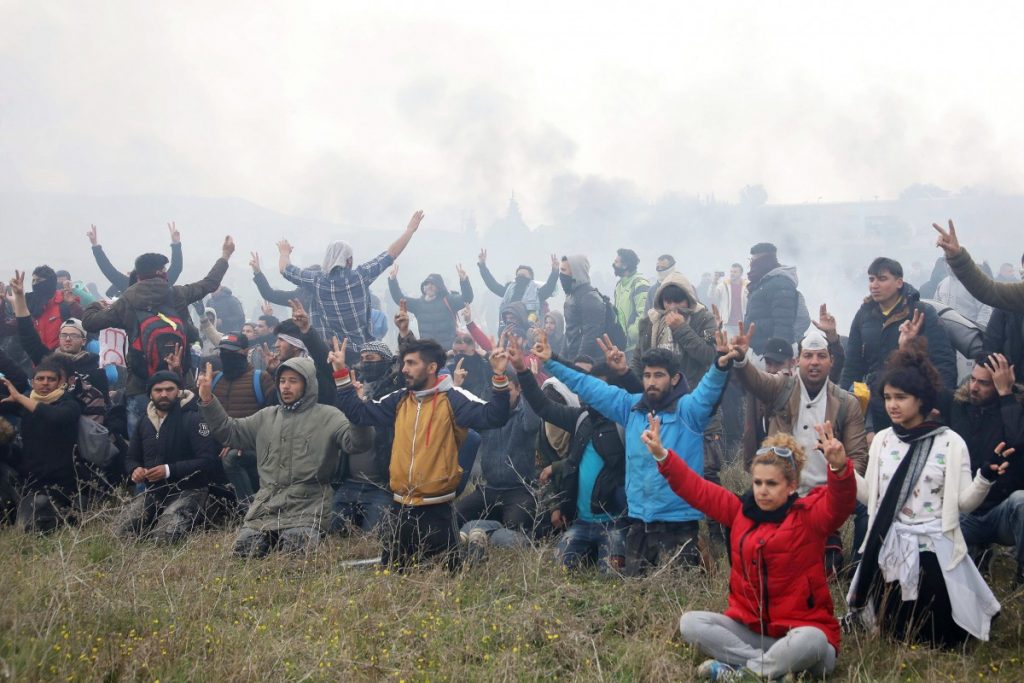The hope for open borders is the last one to die at Idomeni
The newcomers among the refugees in the camp of Idomeni, at the borders between Greece and FYROM,can be distinguished from the old ones. A mixture of hope, activity and eagerness is still visible in their eyes and gestures. An attitude that changes over the days.
And also they still have to find their way around, discover where to find food, pampers for their babies, some sanitary goods.
Huda, a mother head of family, crossed Turkey and the Aegean Sea along with other eleven members of her family—one of whom is the baby of her 21-year old daughter. They arrived yesterday night and now they are trying to find some wood to build a fire. One of the young boys climbed on a tree and cut branches, another child tried to find paper cups to feed the flames. A plastic bag thrown to the bonfire to boost it filled the air with strong smell and thick smoke.
Their first reaction after our, obvious, questions is to ask if we have some news about the opening of the borders. “We heard it is closed but we could not wait. My husband is already in Germany and is waiting for us. We crossed Turkey, we risked to be separated along the way and in the boats, but we managed to make it here, all of us”, said Huda.
“How shall we live?”, asks her daughter, when we inform them that the borders might remain closed indefinitely. “Sooner, or later our money will be finished and how shall I feed the baby?”
The long journey from Syria to the FYROM borders has drained them financially. As they explained, to get to Idomeni have paid—expensively—two taxis from the train station in Thessalonica to discover they had also to pay for the tent if they wouldn’t like to spend their night wrapped only in a blanket—the only facility the authorities and the human aid organizations had to provide them at the time. Now they organize their budget in order to send one of the members of the clan to buy bread and groceries from the village.
Food is a priority to everyone. But in order to get it you have to pay, since the meagre sandwich the camp authorities offer is not enough, both in number and in substance. So, the refugees must do their own shopping. Till now, the situation is manageable, but what if, after ten days of camping for the majority of them, the money runs out? None has foreseen this possibility.
Another potential bomb, which is a matter of time to explode, regards the sanitary condition of the refugees. As the camp gains dimensions, as the number of the refugees increases, the facilities of the place do not suffice at all. The couple of dozen of the existing latrines are already saturated and the scarce showers and faucets for drinkable water cannot satisfy the continuous needs.
The few dustbins as soon as they are emptied, almost immediately, are filled again. The ground is filled almost everywhere with the remains of food, or old socks and broken shoes—none can monitor the kids, for whom the only toys are that rubbish.
The dispensaries of the Medecines Sans Frontieres, or the Red Cross, are incessantly filled with people with respiratory problems, diarrhea and other health problems related with the poor conditions these people live for months. The volunteers fear they will not be able to manage the situation if the number of the newcomers keeps rising.
However, if one turns his eyes to the entrance of the village, or the nearby fields, from everywhere, new groups of migrants walk towards the camp. Some of them, after some hours they turn back and find refuge to the mini camp, that is built at the parking lot and, now, the fields around a gas station before the intersection of the motorway to Idomeni.
There at least they have at reach the mini market and a small restaurant that previously served the track drivers coming to rest to and from their way to Evzoni cross point to FYROM and for now they have some more free and cleaner space.
George-Byron Davos, ANA-MPA, Idomeni, Greecce

